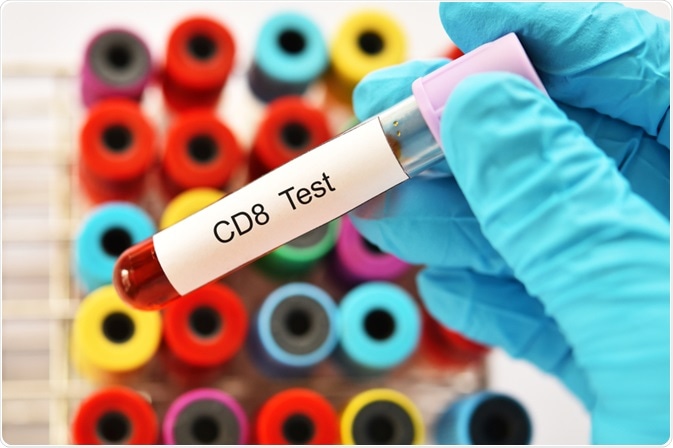Coronavirus disease 2019 (COVID-19) is caused by Severe Acute Respiratory Syndrome Coronavirus 2 (SARS-CoV-2), and continues to affect millions across the world. Disease severity varies with some patients requiring mechanical ventilation, and the mortality rate is thought to be as high as 10%. Several studies have used flow cytometry to investigate how the immune system reacts to SARS-CoV-2.
 Image Credit: Jarun Ontakrai / Shutterstock.com
Image Credit: Jarun Ontakrai / Shutterstock.com
What did the immune profiling of hospitalized patients reveal?
Research revealed that dysregulation of the immune system was linked to the pathogenesis of COVID-19. However, the role remained unclear. Matthew et al. carried out an observational study to investigate the immune response to SARS-CoV-2. The cohort included adults hospitalized with COVID-19 (COVID-19 patients), adults who had COVID-19 (recovered donors) but were not hospitalized, and volunteers who had not had COVID-19 (healthy donors).
First, the authors investigated the peripheral blood mononuclear cells from the cohort. Flow cytometry showed that COVID-19 patients had reduced B-cell and T-cell frequencies compared to the recovered donors and healthy donors. While this could be due to an increase in other cell types seen in COVID-19 patients, it is more likely due to a decrease in B-cells and T-cells.
Further analysis of the T-cells showed that levels of CD8 T-cells were more likely to be reduced compared to CD4 T-cells, which was reflected in clinical cell count data. This data supports previous findings that there is a reduction in lymphocytes during COVID-19.
Going further, the authors then studied T-cell activation in the cohort using flow cytometry. Using principal components analysis (PCA), the authors found that the immune response of COVID-19 patients were distinct from that of the recovered donors and healthy donors. As DC8 T-cells are important in antiviral immune response, the authors focused on these cells.
In COVID-19 patients, the authors found that there was a significant increase in activation markers on CD8 T-cells, indicative of T-cell activation in this group. However, this was not seen for all COVID-19 patients.
The authors also investigated the B-cell population in the cohort further. While the number of naïve B-cells did not differ across the cohort, COVID-19 patients showed a reduction in memory B-cells. This is in contrast to the levels of plasmablasts, which were increased in two-thirds of COVID-19 patients compared to recovered donors and healthy donors. This indicates that there is an antigen-driven immune response to SARS-CoV-2, or potentially proliferation of plasmablasts driven by the reduction of lymphocytes.
Does sex give rise to differences in SARS-CoV-2 immune response?
As the number of people affected by COVID-19 increases, it has been noticed that men seem to suffer higher morbidity and mortality compared to women. Is this down to a difference in the immune response between men and women? Takahashi et al. set out to see if this was the case by investigating various factors including analysis of peripheral blood mononuclear cells by flow cytometry.
This study first looked at samples obtained from patients who had symptomatic COVID-19 and met the criteria (first sample) that they were not in intensive care and had not been given immune modulation medication. They were then followed, alongside other COVID-19patients who did not meet the initial inclusion criteria.
Flow cytometry of peripheral blood mononuclear cells found in the first sample showed that COVID-19 patients had reduced T-cells compared to healthcare workers who had not had COVID-19 (controls), while the B-cell levels were increased in both male and female patients. When followed, it became apparent that T-cell levels in male patients became reduced during the course of COVD-19 compared to female patients.
Another finding showed that T-cell activation was higher in female patients compared to male patients. Monocyte levels were also increased in patients compared to healthcare workers, but different sub-populations of monocytes were elevated in male and female patients; increase in CD14+CD16+ monocytes were more pronounced in female patients, while non-classical monocytes were elevated in male patients.
Can flow cytometry analysis reveal the potential outcome of COVID-19?
Moratto et al. investigated whether differences in peripheral blood mononuclear cells could identify those who would develop severe COVID-19. The authors investigated patients with moderate COVID-19, patients with severe COVID-19 who recovered and those who developed critical COVID-19.
The authors found that lymphocyte counts from samples taken at admission were different among the three groups; levels of CD3, CD4 and CD8 T-cells were reduced with increasing disease severity, as well as a reduction in circulating B-cells.
This study also confirmed previous findings that showed a correlation between the severity of COVID-19 and the level of HLA-DR found on monocytes; those with severe and critical COVID-19 showed reduced HLA-DR on their monocytes. The authors suggest that the level of HLA-DR on monocytes could be determined to identify patients who could develop severe COVID-19.
Following these patients, it became apparent that those who recovered from moderate or severe COVID-19 showed an increase in their CD3, CD4 and CD8 T-cell counts, while those who developed critical COVID-19 did not show this increase. HLA-DR expression also remained low in those with critical COVID-19.
Sources
Matthew, D. et al. (2020) Deep immune profiling of COVID-19 patients reveals distinct immunotypes with therapeutic implications. Science DOI: 10.1126/science.abc8511
Takahashi, T. et al. (2020) Sex differences in immune responses that underlie COVID-19 disease outcomes. Nature https://doi.org/10.1038/s41586-020-2700-3
Moratto, D. et al. (2020) Flow Cytometry Identifies Risk Factors and Dynamic Changes in Patients with COVID-19. Journal of Clinical Immunology https://doi.org/10.1007/s10875-020-00806-6
Further Reading
Last Updated: Feb 5, 2021